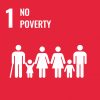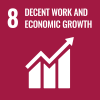Photo: IOM Afghanistan
Gender inequality is magnified in situations of conflict. Women are disproportionately disadvantaged in terms of personal safety, access to employment, resources and basic services in fragile, conflict-ridden environments. They are most affected by poverty and the value of the support they provide at home is mostly rendered invisible.
In a society like Afghanistan, traditional norms often make it difficult for women to access employment, get a loan or start a business. Yet, when women are given an opportunity, they make significant contributions to the growth and development of their families and their communities at large.
Sakina was born in a small village in Helmand in 1995. She was 5 years old when her family fled Afghanistan in 2000 and migrated to Pakistan. With much of her childhood spent in poverty, often doing domestic work in multiple households, Sakina dreamt of going to school like the children of the families she served.
At the age of 14, when she was still playing with her friends, her family informed her that she was going to get married. She doesn’t recall what her reaction to the decision of her parents was.
“I was still a child, after all,” Sakina ruefully smiles.

In 2018, Sakina was employed by a soap production company in Kandahar that partners with IOM on business scale-up under the RADA programme. At her new job, she learnt soap-making and other technical skills needed for the work. Photo: IOM Afghanistan
After she got married, things didn’t get any better. She was still living as a refugee in Pakistan, without proper access to basic services. At 19, she was six months pregnant when her husband was killed in a road accident. In her teens, she was a widow and a mother to a girl child. Her husband’s sudden demise shattered her. For months, she couldn’t stop crying.
However, she had to pull herself together to raise her daughter.
Living in Pakistan without a proper income was extremely difficult. Sakina’s family decided to send her back to Afghanistan in 2018. Upon her return, she started living with her brother-in-law’s family. Being illiterate and not having any professional skills, she struggled to find a stable source of income for over a year. She had to rely on odd jobs to make a meagre living and raise her daughter.
“I had to work to provide food for my young child and pay rent to my brother-in-law. I worked as a maid in different houses, washing dishes and cooking food,” Sakina recollects.
In 2018, the International Organization for Migration (IOM), with support from Afghanistan’s Department of Refugees and Repatriation in Kandahar, selected Sakina for an employment opportunity under the European Union-funded programme Reintegration and Development Assistance in Afghanistan (RADA). She was employed by a soap company in Kandahar which partners with IOM on business scale-up. At her new job, she learnt soap-making and other technical skills needed for the work. Soft-spoken and shy, initially Sakina found it difficult to interact with her colleagues.

The job has not only helped Sakina to take care of her family expenses but has also enabled her to enroll her six-year-old daughter in a private school in Kandahar city. Photo: IOM Afghanistan
“In addition to technical skills, I have learnt how to interact with people from diverse backgrounds and negotiate with the clients. These are the skills that I would need if I wanted to apply for a better job,” says a more confident Sakina.
Before this job, Sakina was under immense pressure it was affecting her mental health. She feared that her daughter would face the same fate as her if she couldn’t give her an education. However, after a year in employment, Sakina’s apprehensions have gradually faded. The soap-making job has not only helped her take care of her family expenses but also enabled her to enroll her six-year-old daughter in a private school in Kandahar city.
“When I was working as a maid, I could hardly make ends meet. The thought that I might not be able to send my daughter to school was making me very anxious. It affected my physical and mental health, and I couldn’t find a moment of peace,” recalls Sakina.
Deprived of an education and subjected to child marriage, the now 25-year-old young woman fully understands the importance of access to education for girls. She believes that education is the only way out in a war-torn country like Afghanistan. Sakina earnestly hopes that parents in her country prioritize education for their daughters and let them grow into working, financially independent women, capable of making their own decisions, instead of marrying them off at a young age.
Now when she talks about her daughter, Sakina’s face lights up with joy and hope for the future. “Things are changing. Women with education are now working in every field — schools, hospitals, government offices and international organizations. Maybe one day, my daughter will also work for an international organization,” says an optimistic Sakina.


